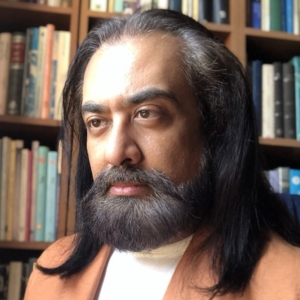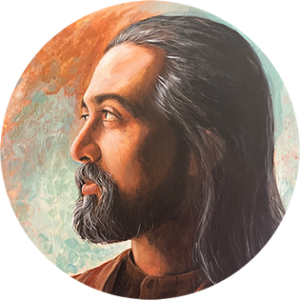BIOGRAPHY
Early Life
Borzou Ghaderi, born on May 9, 1970, in Tehran, Iran, is a distinguished thinker, philosopher, and scholar in Eastern studies. His lifelong fascination with mysticism began at a young age, leading him to deeply explore both Sufism and ancient Indian wisdom. He embarked on his spiritual journey at the age of 9, progressing through various stages of practical Sufism and engaging with numerous mystics to deepen his understanding of esoteric sciences and spiritual practices.
Traditional and Scholar Education
Ghaderi’s educational background spans both traditional and scholarly domains. He pursued academic studies in philosophy, with a specialization in Western philosophy while also delving deeply into theoretical mysticism and Islamic philosophy under the guidance of esteemed mentors. His simultaneous interest in Iranian-Islamic philosophy, mysticism, and Indian spiritual culture led him to immerse himself in Sufi traditions and embark on numerous journeys to India and Nepal. During this period, he studied under prominent masters and mystics, gaining insights from Sufi traditions, mysticism, and philosophy, while also receiving guidance from gurus and swamis in Indian ashrams and the Himalayas.
Ghaderi’s journey in yoga began at age 22 with intensive training across northern and southern yoga traditions. He dedicated himself to contemplation, meditation, and rigorous study, gaining profound insights into yoga philosophy. His path was shaped by interactions with spiritual teachers and focused study of key texts, including the Sutras of Patanjali, which greatly influenced his spiritual path.
Additionally, Ghaderi pursued Iranian and Indian traditional medicine and astrology, earning recognized certifications in Ayurveda and Vedic astrology. His engagement included advanced studies and honorary titles in Vedic astrology, as well as in-depth study of yoga philosophy, Vedanta, and Sanskrit literature, broadening his understanding.
Driven by a desire to integrate diverse mystical traditions, he explored various schools of thought and spiritual teachings in India. These experiences led to meaningful connections with different traditions and Akharas, and he received the spiritual name “Swami Ananda Siddhartha Giri” from the Juna Akhara.
Drawing on his extensive knowledge in both Iranian and Vedic esoteric sciences, Ghaderi sought to synthesize these rich traditions into a cohesive and innovative framework that honors their depth and complexity while presenting them in a contemporary and accessible form. This intellectual and spiritual endeavor focuses on integrating different dimensions of consciousness, spirituality, and knowledge into a unified whole.
Professional and Research Activities
Ghaderi has made significant contributions to the fields of yoga, Vedic knowledge, and Iranian mysticism. He was one of the founders of the “Yoga Association” in Iran and played a key role in co-founding the “Yoga Instructor Training Courses.” He also contributed to the creation of scientifically-oriented yoga curricula, which have been recognized at the university level by the Ministry of Science in Iran.
Furthermore, Ghaderi established the “Iranian Association of Vedic Studies,” introducing Jyotish, Ayurveda, and Sthapatya Veda in Iran. Over the past three decades, he has taught thousands of students in these fields, guiding many towards further studies at reputable institutions. His work has led to a deeper understanding of complementary medicine in Iran, and he has authored several scholarly works, including a book on Vedic astrology that serves as a reference for doctoral studies in traditional medicine in Iran.
He has authored numerous books, articles, and delivered lectures, as well as conducted training courses in the field of Vedic astrology. Through his interactions with traditional masters in Iran, Ghaderi has significantly contributed to the recognition and appreciation of Vedic astrology, particularly its relevance to Iranian traditional medicine. His authored works in this field, including a key reference book for doctoral studies in traditional medicine, have been instrumental in establishing this discipline within the academic landscape of Iran.
The culmination of his efforts led to the successful introduction of Ayurveda in Iran, along with numerous scholarly works authored and translated by him and his disciples. Following the official recognition of traditional Iranian medicine as a university course, Ghaderi was invited to join the Traditional Medicine Committee in the Iranian Elite Association. His work in integrating Ayurveda with Iranian traditional medicine has deepened the understanding of complementary medicine in Iran, with several of his research studies published in Iranian medical journals.
To promote and guide innovative studies and research in ancient philosophies, Ghaderi founded Soura Publications in Iran, where he has published numerous books in Persian, including his own works as well as those of other authors and translators active in these fields. His commitment to fostering harmony between the mystical and philosophical traditions of Iran and India is reflected in his prolific authorship of books, articles, and lectures.
Among Ghaderi’s impactful endeavors is his support for introducing and expanding yoga in the Sulaymaniyah province of Iraq. In 2002, yoga was first introduced there through the dedication of his passionate students, including Hawbir Kamaran, who played a pivotal role in establishing an organization and community for the practice and teaching of yoga in the region. Given the profound mystical ties shared between the ancient cultures of Iran and this area of Iraq, Ghaderi’s influence extended further as some of his works, such as “The Path of Yoga” and “Natural Nutrition and Well-being”, were translated into the Hawrami language by devoted students. Inspired by his teachings, numerous individuals in the region have embraced yoga’s principles, delving into the rich mystical wisdom it offers and seeking a deeper understanding of the spiritual truths inherent in this ancient tradition.
Ghaderi currently serves as the Dean of the Department of Vedic Studies at Tesla University, where he continues to innovate in the field. His role includes the development of curricula for both Master’s and Ph.D. programs in Vedic Astrology, with the first cohort of Master’s students having successfully graduated.


